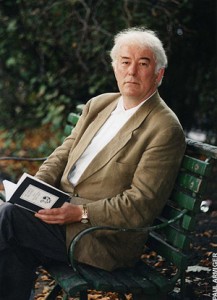 Seamus Heaney was awarded the Nobel Prize in Literature in 1995 for his poetry, and it is no wonder why; his works have their own beauty and rhythm that gives them a kind of musical quality. One of his poems, “Mid-Term Break,” manages to be beautiful despite its tragic content. Its subject is the death of Heaney’s brother at just four years old. The poem’s title is intentionally ironic, since of course coming home due to a death in the family is the furthest thing from a “break.” It also speaks to the emotions that come with dealing with death, especially within the immediate family.
Seamus Heaney was awarded the Nobel Prize in Literature in 1995 for his poetry, and it is no wonder why; his works have their own beauty and rhythm that gives them a kind of musical quality. One of his poems, “Mid-Term Break,” manages to be beautiful despite its tragic content. Its subject is the death of Heaney’s brother at just four years old. The poem’s title is intentionally ironic, since of course coming home due to a death in the family is the furthest thing from a “break.” It also speaks to the emotions that come with dealing with death, especially within the immediate family.
The poem is rife with subtle figurative language, even in its first few lines: “I sat all morning in the college sick bay/Counting bells knelling classes to a close” (1-2). “Knelling” is a sound usually associated with funeral bells, not school bells, and the fact that classes are ending, rather than beginning, is no accident in the poem. Heaney then goes on to describe the reactions of others around him: “In the porch I met my father crying–/He had always taken funerals in his stride—And Big Jim Evans saying it was a hard blow” (4-6). The fact that Heaney’s father is crying, when he “had always taken funerals in stride,” shows just how distraught he is. The poet continues on to reveal his own feelings: “…I was embarrassed/By old men standing up to shake my hand” (8-9). Heaney feels uncomfortable in the unwitting spotlight he’s been thrust into. Along these same lines, he writes:
And tell me they were ‘sorry for my trouble,’
Whispers informed strangers I was the eldest,
Away at school, as my mother held my hand. (10-12)
Heaney remains acutely aware of his surroundings, noticing everything that’s occurring around him. Despite his mother’s efforts at comforting him by holding his hand, Heaney doesn’t feel soothed. Of his mother’s reaction, Heaney notes that she, “…coughed out angry tearless sighs” (13). She is so angry that she is “tearless,” unable to cry. She is exasperated, as evidenced by her “sighs.”
Heaney then goes up to see his brother for the first time since the accident, saying, “I saw him/For the first time in six weeks. Paler now,/Wearing a poppy bruise on his left temple…” (17-19). The author conveys his shock and disbelief at the situation by describing his brother as “wearing” the bruise, rather than seeing the bruise as part of him now. The descriptions are simple and direct, which makes them feel all the more realistic and raw.
The last line of the poem is the most memorable, and heartbreaking: “A four foot box, a foot for every year” (22). Stating the length of the box shows how small the boy is, which further emphasizes how young he is. By writing in an almost detached style, Heaney is able to express the emptiness he feels; and although it is a sad poem, it speaks to its readers, and lets us know that these feelings after a death are perfectly normal.

 “Mid-Term Break” by Seamus Heaney
“Mid-Term Break” by Seamus Heaney



 Funeral Favors Offer Visitors a Tangible Memento
Funeral Favors Offer Visitors a Tangible Memento
 “Comeback” by Prince
“Comeback” by Prince
 “Other Side” Documents Woman’s Fight To Die As She Wishes
“Other Side” Documents Woman’s Fight To Die As She Wishes














